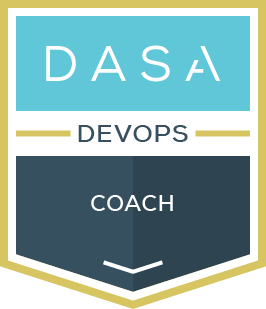Five years ago, we launched the DASA DevOps Coach program, not fully realizing just how transformative it would become. We’ve witnessed the impact that skilled coaches have made within organizations striving for high performance. As we hit this milestone, we want to share some of the lessons we’ve learned and the growing role of DevOps coaches.
DevOps Coaches Became True Catalysts
DevOps coaches have become essential in helping companies transform how they work. They play a critical role in helping organizations move towards flow, agility, and value maximization. Unlike Agile coaches, who focus primarily on team-level efficiency and Scrum practices, DevOps coaches operate more broadly across the organization. They cover the entire value stream, making sure there is alignment between development, operations, and business outcomes. In organizations that already have Agile practices, a DevOps coach complements this by ensuring that these teams can also scale their operations.
Two Levels of DevOps Coaching: Enterprise and Software Team Productivity
DevOps coaching creates significant impact at two levels: Enterprise DevOps Coaching and Software Team Productivity Coaching.
- Enterprise DevOps Coaching: Enterprise DevOps coaches play a pivotal role in guiding organizations through their transformation journey. They align practices, tools, and culture to drive faster, more reliable software delivery. These coaches collaborate with transformation teams, senior managers, and capability owners, acting as advocates for a DevOps culture built on collaboration, ownership, and breaking down silos. They emphasize a “shift-left” approach to embedding quality and security early in the delivery pipeline. They also help establish and nurture internal communities or forums, enabling knowledge-sharing, the dissemination of best practices, and the celebration of success stories.
- Software Team Productivity Coaching: Focused on the team level, this type of coaching identifies bottlenecks in the software delivery lifecycle and recommends targeted improvements such as adopting CI/CD pipelines, Infrastructure as Code, or Agile principles. Team productivity coaches act as mentors, guiding teams in the real-world application of DevOps practices and equipping them with critical skills in areas such as version control, cloud platforms, and monitoring tools. They also recommend and track key metrics, such as deployment frequency, mean time to recovery, and change failure rates, to measure progress. By conducting workshops and hands-on training, these coaches ensure teams are equipped to thrive in a high-performance environment.
DevOps vs. Agile Coaches: Similarities and Yet Some Critical Differences
Agile and DevOps coaches both focus on improving collaboration, enhancing workflows, and driving cultural transformation within organizations. While an Agile Coach emphasizes fostering Agile practices like Scrum, Kanban, and iterative delivery to improve team-level productivity and responsiveness, a DevOps Coach centers on bridging development and operations by introducing automation, CI/CD pipelines, and infrastructure optimization for end-to-end delivery. Both roles aim to align teams with organizational goals, but Agile Coaches concentrate more on process and team dynamics, while DevOps Coaches balance cultural shifts with technical enablement across the entire software delivery lifecycle.
Effective DevOps Coaching Leads to Flow and Agility
The shift from traditional IT practices to Agile, and eventually to DevOps, requires more than just process changes. Coaches have been instrumental in helping organizations make progress with their cultural transformation. They ensure that DevOps is about creating a continuous improvement mindset, fostering collaboration, and delivering customer value as much as it is about adopting tools or new frameworks. This holistic approach has proven essential in helping teams achieve agility and flow.
DevOps Coaches Play a Key Role in Managing Change
A coach’s ability to help teams adapt to new ways of working is crucial. We’ve seen that organizations thrive when coaches focus not just on implementing technical practices, but also on fostering a high-performance culture. Coaches provide guidance on how to improve team collaboration, handle resistance to change, and create an environment where continuous learning is the norm. Their efforts help align technical improvements with broader business goals, ensuring a sustainable transformation.
Building Competencies Goes Beyond Achieving Immediate Results
We’ve seen that developing both foundational and enabling competencies is key to long-term success. While technical skills are important, coaches make the greatest impact when they help teams cultivate leadership, collaboration, and systemic thinking. This focus on building competencies goes beyond achieving immediate results. It nurtures a culture of growth and resilience across every level of the organization.
Hands-On Coaching Transforms Team Performance
Teams are at the heart of DevOps, and effective coaching is what helps teams evolve into high-performing units. Coaches guide organizations in understanding the unique needs of their DevOps teams and helping them through the stages of team development. A key lesson we’ve learned is the value of hands-on approaches like the “Gemba walk,” where coaches closely observe teams in action, identify bottlenecks, and provide real-time guidance to streamline processes. This method has consistently helped teams become more efficient and aligned.
A Structured Approach Accelerates DevOps Success
One of the biggest lessons learned is the importance of guiding organizations through clear, practical steps on their transformation journey. Coaches help organizations break down their transformation into manageable phases, focusing on areas like value stream analysis, automation, and tooling, ensuring that change is both strategic and scalable. This structured approach enables organizations to realize measurable results faster and more effectively.
DevOps Coaches Align IT and Business for Sustainable Change
These lessons have not only shaped our program but have also proven their value in real-world, large-scale transformations. Even highly regulated government agencies like UWV and Belastingdienst in the Netherlands adopt the program to support their large-scale transformations. They’ve used it to help teams work smarter and deliver better value to the public. It’s clear that when a DevOps coach is involved, organizations—regardless of their sector—can navigate change more effectively.
The DASA Coach Program has been adopted by dozens of organizations as a way of building and nurturing the coaching capabilities/capacity. We continue to learn and improve the program and tools we offer to the coach community including a set of value boxes, and additional programs to deepen the capabilities on specific topics:
- Target Operating Model for DevOps Organizations
- Technology Landscape of DevOps
- DevOps Team Capability Model & Productivity Metrics
Looking Ahead
As we celebrate five years of the DASA DevOps Coach program, we’re excited about what’s to come. The need for strong leaders who can guide teams through change and drive innovation is only growing. As enterprises become more complex, the role of DevOps coaches will be ever more essential in ensuring that technology and culture remain aligned.
Here’s to five years of impact. And many more ahead!


DASA DevOps Coach
This three-day course is for individuals aspiring to guide teams and organizations through the complexities of DevOps transformations.
